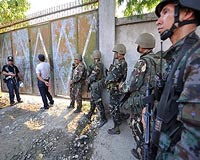 |
Kano, Nigeria (UPI) Sep 21, 2010 The recent breakout by scores of Islamist militants from a prison in northern Nigeria has raised fears the extremist Boko Haram sect plans a new uprising in retaliation for a ruthless government crackdown and that the United States could be a target. The threat of serious trouble from the Islamists, who have been engaged in eye-for-an-eye massacres with Christians in central Nigeria for the last several years, will deepen the political upheaval in the oil-rich African state triggered by the May 5 death of President Umaru Yar'Adua. Nigeria's 150 million population is roughly split between Muslims and Christians. In recent months, security forces have hunted down the leaders of Boko Haram -- which means "Western education is sacrilege" in the local Hausa language -- and jailed hundreds of members. Some were summarily shot. But intelligence reports say Boko Haram, which wants to impose Muslim religious law, has been rearming across the north to launch a new offensive. A recent sub-Saharan poll indicated that 58 percent of Africans fear religious conflicts will erupt in the years ahead. Al-Qaida, which is active in northern Africa and in Somalia in the east, isn't known to have a significant influence among Nigerian Islamist militants, although one group is known as "the Taliban." But the Algerian-led al-Qaida in the Islamic Maghreb recently said it had been in contact with the Nigerian militants. If that develops, Nigeria, a major oil supplier to the United States, could become a battleground in the war against terrorism. That could destabilize West Africa, now emerging as a leading oil producer, which gives it strategic value for both the West and Asia. The prison breakout in Bauchi state took place Sept. 7. Militants attacked the facility with gunfire and explosives. Some 750 inmates escaped. About 150 of them were Boko Haram militants awaiting trial for a 2009 uprising in which some 800 people were slain. In recent weeks gunmen on motorcycles have attacked security personnel, killing several, in what many see as a prelude to another uprising. A new video posted on jihadist Web sites shows Boko Haram leader Imam Abubakr Shekau declaring a new jihad, with a new target: the United States. "Do not think jihad is over," he warns. "America, die with your fury." Yar'Adua's death touched off a power struggle between the political barons of the predominantly Muslim north and their rivals in the overwhelmingly Christian south. Thousands of people have died in the religious bloodletting in the central Middle Belt region over the last few years. Another potentially explosive zone is the oil-rich Niger Delta in the south. Disgruntled and impoverished tribal insurgents attacked the oil industry demanding a better share of oil revenues. Their depredations slashed production by one-third, a serious economic setback in a state that depends on oil exports. Yar'Adua negotiated a cease-fire but that collapsed when he died and the insurgents are threatening new attacks. Yar'Adua's successor, his vice president, Goodluck Jonathan, announced Sept. 15 he will run in presidential elections scheduled for January. Following the prison break, Jonathan, a southern Christian, has made sweeping changes in the leadership of Nigeria's military and security forces, apparently to ensure commanders remain loyal to him in his struggle with the Muslim political bosses. The army is Nigeria's most powerful institution. So it was no surprise that Jonathan appointed another southerner, Maj. Gen. Onyeabor Azubuike Ihejirika, from the Igbo tribe in southeastern Nigeria, as army chief of staff. Ihejirika is the first Igbo to hold that post since the 1967-70 war in Biafra. That secessionist struggle led by the Igbo ushered in an era of military dictatorships that ended in 1999. Under a political pact, the presidency is alternately held by north and south for two four-year terms. Yar'Adua, a northerner, hadn't completed his first term when he died. Northern leaders say they still have one term coming before the south can assume the presidency. So a victory for Jonathan next year could ignite regional rivalries. "Jonathan is worried not only about the potential for a military coup," says the U.S. global security consultancy Stratfor, "but also about how his political opponents could point to his inability to provide security in any of these regions as a way to discredit him during the campaign."
Share This Article With Planet Earth
Related Links The Long War - Doctrine and Application
 Less Is More In The Fight Against Terrorism
Less Is More In The Fight Against TerrorismBoston MA (SPX) Sep 21, 2010 Terrorist networks are complex. Now, a mathematical analysis of their properties published this month in the International Journal of Networking and Virtual Organisations, suggests that the best way to fight them is to isolate the hubs within the network rather than trying to destroy the network as a whole through short-term battles. According to Philip Vos Fellman a Lecturer at Suffolk Un ... read more |
|
| The content herein, unless otherwise known to be public domain, are Copyright 1995-2010 - SpaceDaily. AFP and UPI Wire Stories are copyright Agence France-Presse and United Press International. ESA Portal Reports are copyright European Space Agency. All NASA sourced material is public domain. Additional copyrights may apply in whole or part to other bona fide parties. Advertising does not imply endorsement,agreement or approval of any opinions, statements or information provided by SpaceDaily on any Web page published or hosted by SpaceDaily. Privacy Statement |